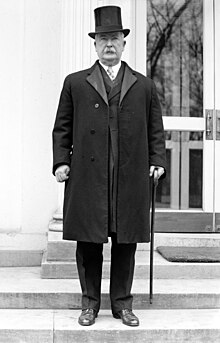Emmet O'Neal
| Emmet O'Neal | |
|---|---|

Emmet O'Neal
|
|
| 34th Governor of Alabama | |
|
In office January 17, 1911–January 18, 1915 |
|
| Lieutenant | Walter D. Seed, Sr. |
| Preceded by | B. B. Comer |
| Succeeded by | Charles Henderson |
| Personal details | |
| Born |
September 23, 1853 Florence, Alabama |
| Died | September 7, 1922 (aged 68) Birmingham, Alabama |
| Resting place | Florence Cemetery |
| Political party | Democratic |
| Spouse(s) | Lizzie Kirkman |
| Occupation | Lawyer |
Emmet O'Neal (September 23, 1853 – September 7, 1922) was an American Democratic politician and lawyer who was the 34th Governor of Alabama from 1911 to 1915. He was a reformer in the progressive mold, and is best known for securing the commission form of government for the cities of Alabama.
O'Neal was born on September 23, 1853 in Florence, Alabama to Edward A. O'Neal and Olivia Moore O'Neal. His father Edward A. O'Neal was a Confederate Army officer and served as Governor of Alabama from 1882 to 1886, as a Democrat. O'Neal received his early schooling in Florence and was a student at the University of Mississippi in 1870 and 1871. He received the degree of A.B. from the University of Alabama in 1873. Reading law under the supervision of his father, he was admitted to the bar in Florence in 1876. In 1901 and in 1910 he was elected and served as president of the Alabama Bar Association. In 1911 he was made a member of the governing board of the American Bar Association.
O'Neal served as a presidential elector in Alabama's 8th congressional district in 1888 and was an elector at large from Alabama in 1892 and 1908. He was appointed as United States District Attorney for the Northern District of Alabama and served in that capacity from 1893 to 1897. In 1901, he served a member at large in the Constitutional Convention of 1901, where he served as a member of the committee on rules and regulations, chairman of the committee on local legislation and a member of the committee on suffrage. He played a large role in framing the suffrage provisions so as to eliminate the illiterate black vote without running afoul of the US Constitution as then interpreted. In the runup to the 1908 presidential election, he made an extensive speaking tour in the West campaigning for William Jennings Bryan. In 1909, he campaigned against the addition of a prohibition amendment to the Constitution of Alabama.
...
Wikipedia
